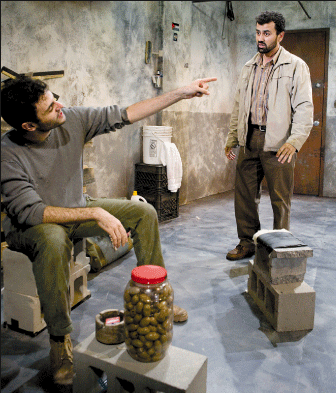By Stephanie Murg
“The Sopranos” may have come and gone, but a new play proves that the windowless backroom of a butcher shop is still the perfect setting for family drama. Ilan Hatsor’s “Masked,” now playing at the DR2 Theatre, takes place in an Arab village in the West Bank, a world away from Satriale’s, but Tony and the gang would recognize the concerns that drive these characters’ conversations and conflicts: questionable leadership, informers, blood money, arson, survival. In short, “Masked” is the story of a family in crisis. And it just happens to be set against the Palestinian Intifada of 1990.
The play depicts one night in the lives of three Palestinian brothers. Thirty-year-old Daoud, the oldest brother, is a married father who works in Israel. Na’im, the middle brother, is a senior member in the leadership of the resistance, which the youngest brother, Khalid, has just joined. Among Khalid’s odd jobs is cleaning a family butcher shop, where the entire play is set. A tragic incident in the brothers’ past puts Daoud at odds with Na’im, and the play’s tension builds not from the chaos outside but through the brothers’ conversations, accusations, and revelations that occur inside the butcher shop’s blood-stained walls.
Born and raised in Israel, Hatsor wrote “Masked” while a freshman at Tel Aviv University. “Looking back, I can see the influence of my first year of college on the play,” he says. “I was studying the classics, which made me lean toward a very minimal structure. I was drawn to elemental things: a family, brother against brother.”
While “Masked” was the first play written by an Israeli about the Palestinian uprising, that wasn’t the point. “When I wrote the play, I didn’t think of my characters as Arabs or Palestinians,” he says. “I just thought about them as brothers.”
The son of an Iraqi mother and an Israeli father with roots in Morocco, Hatsor had little difficulty adopting a Palestinian perspective and fully engaging with Arab culture. “I speak the language. I love the music and the food,” he says. “In this way I’m similar to many Israelis, for whom a big part of their culture is Arab. And yet unfortunately we’re still enemies.”
Ami Dayan, the play’s director, first saw “Masked” performed in Israel in 1992 and was stunned. “Two things about the play captured my interest,” says Dayan, a relative of Israeli military leader Moshe Dayan. “First, the beautiful structure, its dramatic impact as a universal piece of theater. The second thing was the setting, that [Hatsor] had placed the play right here in our backyard.”
In talking with Hatsor and Dayan, one is struck by the way that they date events in their lives, not with markers of personal achievement, such as graduation or marriage, or even with calendar years, but with the timing of developments in the Middle East. And it was one such development that drove Dayan to mount his own production of “Masked.”
“I took the play with me when I started traveling,” says Dayan, who left Israel in 1999 to pursue an arts scholarship in Boulder, Colorado, where he now lives. “It was only when Hamas took the [Palestinian Legislative Council] elections in January of 2006 that I decided that this was time and that it had to be done now.”
Of his production of “Masked” last year in Colorado, Dayan says that he was surprised by the magnitude of interest in the play, particularly by the Arab community, and also by the reactions that it engendered. “The discussions about the play weren’t argumentative,” he says. “I would have expected more fiery discussion, but because of the play’s emotional impact, there’s not much room for the usual argumentative tones that you hear when people talk about anything related to the Middle East.”
Both Hatsor and Dayan emphasize that “Masked” is not designed to ‘educate’ people about the Middle East situation or make them sympathetic to a particular point of view. “My hopes are that it becomes more about people and less about agendas,” says Dayan. “It’s very easy to create a provocation on stage and make people upset,” adds Hatsor. “But the story of “Masked,” while of course it carries some criticism of the Israeli occupation and on the other hand the Palestinian violence, all in all, it’s about a family that is torn apart by bigger forces.”
The New York production seems to be successfully conveying this nuanced message. During a recent post-show discussion that included Hatsor, a rabbi, and a reporter, the talk turned to the various forms of violence that emerge in the play. “There’s physical violence and verbal violence, but there’s also economic violence,” says Dayan. “And for our audiences to be recognizing this is great.”
Dayan plans to follow up “Masked” with a workshop for “Conviction,” a play by Oren Neeman based on an inquisition trial from the national archives of Spain. As for Hatsor, the current condition of the Middle East has driven him to switch genres entirely. “The situation is so despairing that I think the right reaction is humor,” he says. “So in the last few years, I’ve been writing mostly comedies.”
MASKED. Written by Ilan Hatsor. Translated by Michael Taub. Directed by Ami Dayan. Now in an open run at DR2 Theater, 103 East 15th St., at Union Square East. 212-239-6100.







































